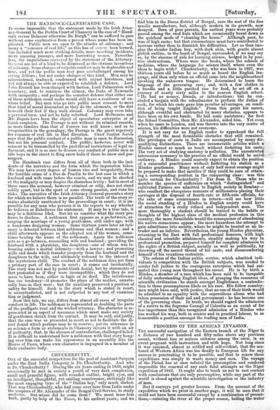THE HANDCOCK-CLANRICARDE CASE.
IT seems impossible that the statement made by the Irish Attor- ney-General to the Dublin Court of Chancery in the case of "Hand- cook versus Delecour otherwise De Burgh" can be suffered to pass without some explanation from a person whose name has been im- plicated. Public men are open to the attacks of calumny ; and many a "romance of real life" as this has of course been termed, has included much more striking details, more touching incidents, more amusing passages, and more harrowing scenes. Neverthe- less, the imputations conveyed by the statement of the Attorney- General are not of a kind to be dismissed as the obvious inventions of calumny. Some charges of culpable conduct may be deplorable and true, and yet the public man may pass unchallenged among his erring fellows; but not under charges of this kind. Men may be misconstrued, traduced, condemned with unjust harshness, and yet not always be able or expected to establish a defence. Lord John Russell has been charged with faction, Lord Palmerston with treachery, and, to continue the climax, the Duke of Newcastle with incapacity ; and perhaps the soundest defence that either one of these noblemen could make would still leave a residuum of en- vious belief. But men who go into public must consent to meet that kind of moral discomfort as they do the elements, or the dirt beneath their feet if they walk abroad. Calumny may even take a personal turn, and not be fully rebutted. Lord Melbourne and Mr. Rogers have been the object of speculative enterprise or of harsh suspicion. The Peerage is not without its criminal records, as more families than that of Ferrers too well know; and as to irregularities in the genealogy, the Peerage is the great repertory for romance of real life in that direction. Chief Justice Jervis says that the public conduct of a public man is open to discussion, but not his personal conduct. The public, however, never will consent to be trammelled by the packthread restrictions of legal re- finement, and it is as sure to discuss any conduct of public men as idle boys in the street to fling snow-balls if there be snow and pas- sengers.
The Handcock case differs from all of these both in the inci- dents of the narrative and the form which the imputation takes. We may have every degree of human vice and irregularity, from the horrible crime of a Duo de Praslin to the last case in which a husband and wife came before the courts, and we may be shocked at the malignity or may despise the shameless levity; but in most of these cases the accused, however criminal or silly, does not stand coldly apart, but is the sport of some strong passion, and runs his risks. The narrative of the Irish Attorney-General presents a story for which we believe there is no paralleL The truth of the story re- mains absolutely unattested by the proceedings in court; it is im- possible for any man who peruses it in the reports to say whether he believes or disbelieves the statement. It may be a true tale, it may be a fictitious libel. But let us consider what the story pro- fesses to disclose. A nobleman first appears as a go-between, ar- ranging the marriage of a young gentleman, still under age, with a handsome designing woman. Some thirteen years later an inti- macy is detected between that nobleman and that woman ; and a child afterwards appears as the adopted son of the woman, some- times bearing the name of the nobleman. Again the nobleman • acts as a go-between, reconciling wife and husband ; providing the -husband with a physician, the daughters—one of whom was la- bouring under a mortal infirmity—with a lawyer; and promoting wills and deeds which transfer property from the husband and the daughters to_the wife, and ultimately redound to the interest of the mysterious child. The conduct of the nobleman does not form a primary part of the ease in court ; it comes out incidentally. The story was not met by point-blank denial, but by statements of fact presented as if they were incompatible; which they do not seem to have been, either in logic or in' deed. The interference has one tendency—it promotes the plans of the mother, unnatu- rally base as they were ; but the auxiliary preserved a position of safety for himself. Such is the story which is stated in court, is uncontradieted, and is not subjected to any test of examina- tion or judgment.
Now this tale, we say, differs-from almost all cases of irregular conduct in life. The nobleman is represented as doubling the parts of the profligate roué and the wicked attorney. The character is re- presented in an aspect of meanness which must make any society of gentlemen shrink from the contact. It may be said, and justly, that the ease was so presented in court as not to facilitate the di-
rect denial which perhaps may be in reserve ; yet its utterance in so solemn a form as statements in Chancery invests it with an air of authority, that, in the absence of contradiction, challenged belief. It is difficult to Understand how a nobleman with that story hang- ing over him can make his appearance in an assembly like the House of Peers, whose own character is impugned in a member of their exclusive body.


























 Previous page
Previous page